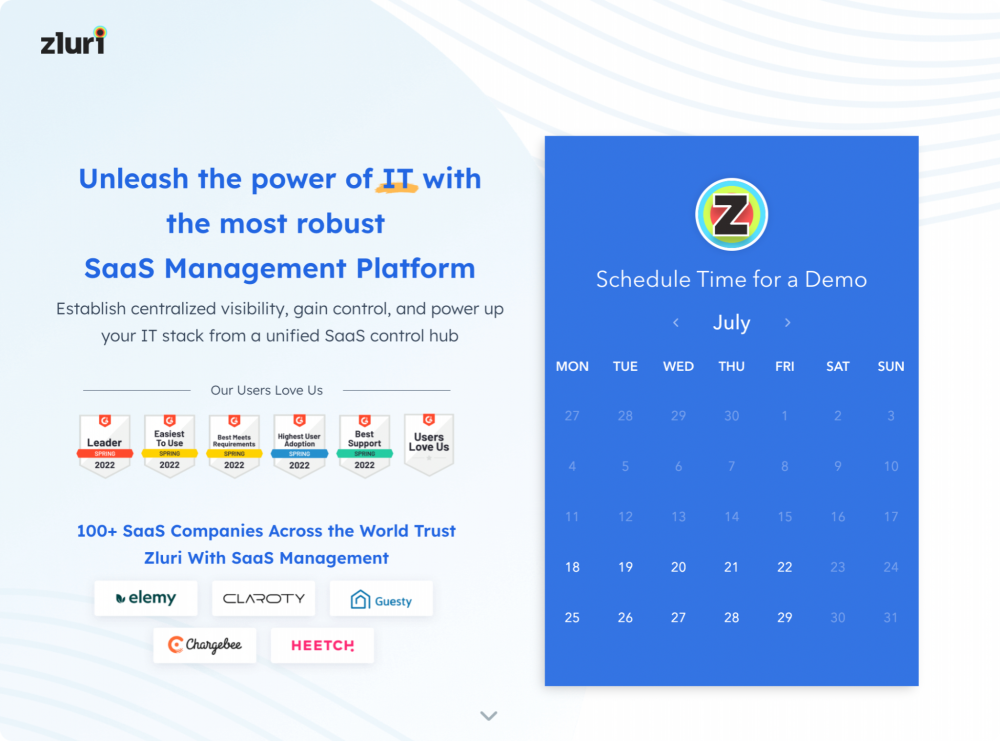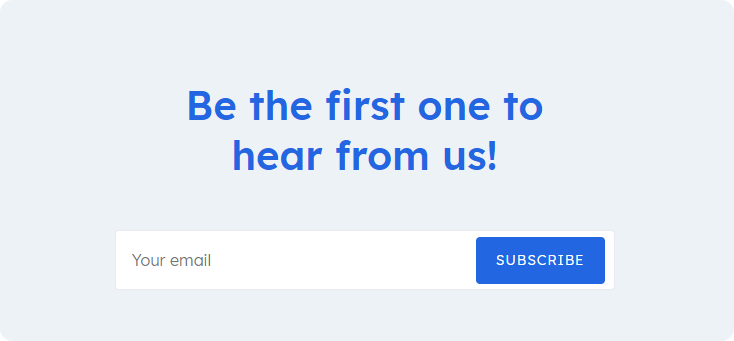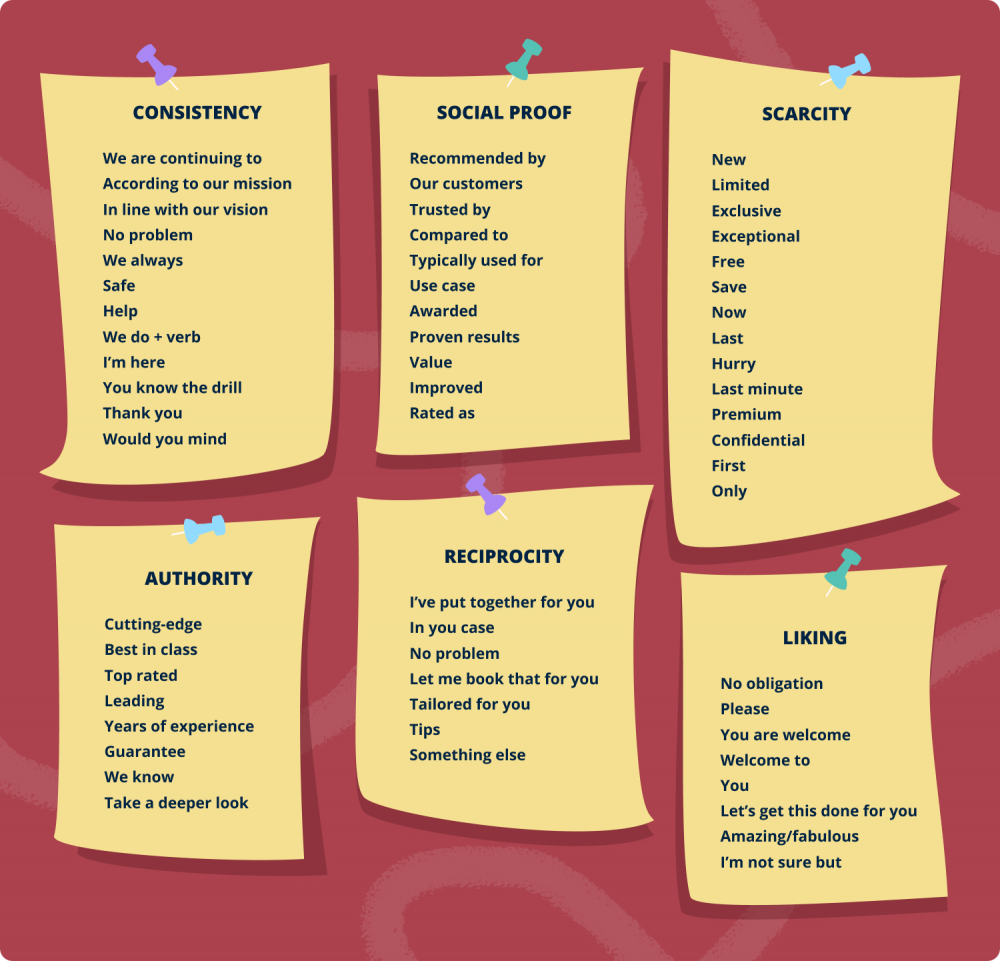In sales, communication plays a pivotal role. Your product might be of super value to the customer, but unless you master the required soft skills, closing a sales deal will become a challenging adventure. And when it comes to the art of communication, your success depends on what you’re saying to your prospects and how you’re saying it.
In this post, we’ll talk about specific sales words and phrases you should add to your vocabulary to sound persuasive and win more deals.
6 principles of persuasion for sales
Before we get into the sales words and phrases you can pepper your sales flow with, let’s look at the main principles of persuasion found by a famous American psychologist, Robert Cialdini, and psychologically proven successful for closing a sales deal.
They are the following:
- Reciprocity
- Consistency
- Social proof
- Authority
- Liking
- Scarcity
Sales words and phrases that follow these persuasion principles will help you quickly win over your prospect and move them closer to conversion.
To help get a better idea of these powerful words and their use cases, we’ll be leaning on a guide from Zluri, “Top 8 Okta Alternatives to Consider in 2024.” The SaaS management platform uses some of Cialdini’s principles and keywords to convince readers that Zluri is a better option than Okta. We’ll be pinching plenty of screenshots from the article — thanks to the Zluri team in advance!
Let’s consider these 6 persuasion principles in more detail.
Reciprocity: give and get
If you’ve already been using content marketing as a part of your inbound sales strategy, you must be familiar with the persuasion tactic of reciprocity. You appeal to reciprocity when you provide your prospects with valuable content, like ebooks, podcasts, video tutorials, and so on. The idea is simple: you’re gifting your users with what they need, and they’ll return the favor in the future.
This is what Zluri is doing with their guide on the alternatives to Okta. They offer their audience a comparison of Okta to other similar services, including Zluri themselves, and unveil their features, pros, cons, pricing, and rating.
In other words, they share free content that brings real value to readers – the guide simplifies the evaluation stage of their buyer journey and helps them with decision-making.

Consistency: follow your promises
When it comes to communicating with sales prospects, consistency is a two-way street. Let’s explore both directions.
On the one hand, people appreciate brand consistency, which means you must be uniform in your mission, vision, and actions. For example, at the beginning of their guide, Zluri states that in their post, they’ll analyze the alternatives of Okta and provide detailed information about their features and pricing, and so they do. When readers get what they’ve been promised, their trust in the brand grows, making them more likely to deal with the company further.
On the other hand, people love to be perceived as consistent, as it makes them look reliable and responsible. You can use this trait in sales as well! Ask a lead to do a small-lift action, say, rate your service, and if they agree, they’ll be more likely to do a higher-lift action for you in the future, e.g., write a review about your product.
Social proof: be the one people recommend
Social proof is critical if you hope to convince someone to invest in your SaaS. 88% of people trust user reviews as much as they’d trust a personal recommendation. What’s more, the average customer reads 10 online reviews before making a purchasing decision.
Therefore, you should show your prospects what users think about you and share testimonials and awards that position you as the service people love. On your landing page, you can place direct reviews from your current customers or links to customer review platforms where users left appraisals of your service.
For instance, while following the CTA “Book a Demo” that Zluri left at the end of their guide, you’ll be forwarded to the conversion page, where the company shares social proof — G2 rewards and logos of popular companies that became their service users:

Authority: become a thought-leader
You’ve probably heard it not once: “We need to create more thought-leadership content.” What does this mean?
It means you need to create content that will showcase your brand as an authority within your niche. This way, potential users will be more likely to believe what you say and invest in your product.
Zluri presents its brand through a blog article which they call a ‘guide’ for a reason. The company demonstrates they have the expertise to share and do it regularly (you can see their other posts in the ‘Featured blogs’ section), so readers who appreciate their articles become their potential customers.

If your reputation is not authoritative enough, you can lift your credibility by aligning with the respected personas known as industry influencers.
Liking: build influential relationships
If you love a brand, you’re more likely to trust them and, eventually, buy from them. It’s relationship-building 101 and the most common persuasion technique used among sales teams. Get your prospects to like you.
There are many ways your sales team can use this principle at work, e.g., building rapport, offering prospects relevant content or special incentives, or using specific vocabulary that would make them like you and influence their decision-making.
We’ll explore it in the following chapter.
Scarcity: make people act fast
Scarcity is one of the oldest tricks in the books. Although people are much wiser to scarcity these days and traditional sales words such as “buy now” or “only today” are perceived as spammy, this tactic is still used more subtly in marketing and sales campaigns. Why? Because people want what others can’t have.
In practice, the principle of scarcity looks the following way: you’re pushing your buyer to make a decision under the influence that they won’t be able to make that decision in the near future. At the same time, scarcity can imply VIP-only access to a product, heightening its value.
Below we’ll consider what words and phrases are used by Zluri as a part of their scarcity tactic.
60 sales words and phrases based on Cialdini’s principles of persuasion
Now that we’ve discussed 6 basic principles of persuasion, let’s go through a list of the most common sales words and phrases pertaining to each principle, which can bring you conversions and boost sales as soon as you add them to your marketing and sales campaigns.
Sales words & phrases for reciprocity
To put a principle of reciprocity into action, you can use the following words and phrases in your blog posts, on a landing page, in cold emails, or in any other piece of communication with prospects (we’ve also explained the meaning each phrase conveys):
- I’ve put this together for you: show a sales prospect you’ve gone the extra mile and put together something specifically for them.
- In your case: show that you’re not just going through the motions but tailoring the conversation to the prospect’s problem.
- No problem: let a prospect know that helping them is what you’re here for, and their asking for help is much welcomed.
- Let me book that for you: save your prospect the time and effort of organizing catch-ups on their end.
- Tailored for you: imply that it took time to prepare a plan or sales asset specifically for your prospect’s use case.
- Tips: focus your prospect on the fact you’re providing them with insider information to put them in a better position after using your service or product.
- Something else: always give the prospect more than what they asked for. Answer a question and back it up with more info.
Sales words & phrases for consistency
If you want to emphasize consistency, you should use a vocabulary that demonstrates you are in line with your mission, vision, and promises. Let’s consider the words and phrases that help you apply the consistency principle in sales:
- We are continuing to: underline you’re consistent in your actions by continuing to help customers solve their pain points.
- In line with our mission/vision: stay true to your brand’s mission or vision while reminding a prospect why you’re doing something.
- We always: emphasize this is something you repeatedly do and will continue to do in the future.
- Safe: if you position yourself as a company that cares about privacy and security (which is a must for all businesses), remind a prospect that their data, actions, and conversations are in a safe space.
- Help: as every sales pitch should be based on helping customers solve their problems, consistently stress it throughout the sales process using the respective word.
- We do + Verb: use an emphatic ‘do’ to let the prospect know the lengths you’re always going to for them.
- I’m here: remind prospects they can always rely on your help – the phrase can work wonders for your professional relationships.
- You know the drill: use it as a light-hearted way of letting someone know how reliable you are.
- Thank you: showcase the prospect’s consistency through gratitude. As soon as you thank them for doing a “small” favor for you, ask them to do a little more.
- Would you mind: ask a customer for a favor and win the starting blocks of consistency with which they’ll do bigger favor to your business.
Sales words & phrases for social proof
To convey social proof, your sales vocabulary should include words and phrases that would tell your prospects that customers adore you and will choose your brand over and over again:
- Recommended by: you’ll notice that many popular SaaS comparison websites use this phrase. Use it on your sales pages close to the sign-up forms to show that people trust you.
- Our customers: remind customers that your business is relied on by many users.
- Trusted by: showcase some big names in your client roster and let prospects know they’ll be among them.
- Compared to: as prospects always look for comparisons, underline how your product contrasts similar solutions – with a competitive advantage, of course.
- Typically used for: remind your prospect that your product is popular with users.
- Use case: sales prospects love use cases, so if you have any to share, ensure your potential customers come across the phrase ‘use case’ here and there through your web page or emails.
- Awarded: any award your company or product may have won is a testament to its success, so use this word to let prospects know about your high appraisals.
- Proven results: let the numbers do the talking for you – quantify social proof using numbers backed up by this phrase.
- Value: since your key mission is bringing value to customers, use this word to remind your prospects of what your product can do for them.
- Improved: another great word to use when it comes to highlighting the value of your product.
- Rated as: just as Zluri has used it in our example below, ratings are exceptionally important for those shopping around. Prospects often value third-party opinions over yours.

Sales words & phrases for authority
Don’t forget to enrich your sales campaigns with words and phrases indicating your knowledge, expertise, and status. For instance:
- Cutting-edge/Top-rated/Best-in-class/Leading: “Don’t worry, you’re dealing with the best-in-class product/service”— affirm your company is leading the way.
- Years of experience: “We’ve got XX years of experience in the area” — emphasize you’ve got baggage of experience behind using factual information (how many)
- Guarantee: “We guarantee your money back if you’re not satisfied” – use this powerful word to establish your status – you’re a company that is confident in its expertise.
- We know: demonstrate you’re competent in your niche, as well as in meeting the needs and wants of your prospects.
- Take a deeper look: use this phrase to imply you have a more profound knowledge of the subject and are ready to share it with readers. For example, take a deeper look at the example we pulled from Zluri’s article:

Sales words & phrases for liking
To win the affection of a sales prospect, use the following sales vocabulary:
- No obligation: “You’re under no obligation to buy after the product demo”— take the pressure off the buyer and put the power back in their hands.
- Please/You’re welcome: words of politeness go a long way in the business world.
- Welcome to: a warm welcome to the call or meeting will immediately help your potential buyer feel at ease.
- You: use a 2nd person pronoun more often to shift the focus to the buyer and their needs.
- Let’s get this done for you: ensure a prospect you’re ready to go the extra mile to satisfy their needs.
- Amazing/fabulous: use extravagant adjectives that would stand out from the typical good/great and make your sales proposal more likable and memorable.
- I’m not sure but let me get back to you: It’s important to always admit if you don’t know something but reassure your buyer that you’ll find the answer for them. Honesty is the best policy.
Sales words & phrases for scarcity
Lastly, scarcity words are aimed at enticing your prospect to buy faster. They need little explanation but should be considered in your sales collateral:
- New
- Limited
- Exclusive
- Hurry
- Free
- Save
- Now
- Last
- Last minute
- Premium
- Confidential
- First
- Only
However, be careful while using these words in emails. Some of them, once used excessively, can trigger spam filters and affect your email deliverability.
Zluri applies the scarcity principle by placing a specific call-to-action on the subscription form right below the post — “Be the first one to hear from us!” It’s difficult not to notice how the company appeals to exclusiveness using the phrase “Be the first one,” isn’t it?

Here is the list of all 60 sales words and phrases that can help you succeed in closing a deal if you add them to your everyday sales vocabulary:

Wrapping up
Cialdini’s principles of persuasion have been proven powerful for marketing and sales, so why not apply them to your campaigns? We’ve provided you with the 60 most persuasive words and phrases, but many more exist out there. If you know any special vocabulary that brings you conversions, feel free to share it with us in the comments.
And to ensure your email campaigns always hit the target, use Snov.io’s email checker.




